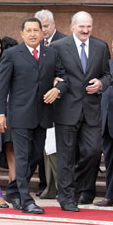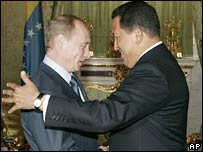Compiling a photographic record
Katy says: I am going to ask Quico's loyal readers for a favor in an experiment I have in mind.
Any time you see a pro-Chávez sign in a government building or institution
such as this one, I'd like to know about it. So I want to ask all of you out there to take and/or circulate photographs showing electoral publicity for Chávez in a government building, and I'd like you to send them to me.
Bruni is doing a great job of covering government advertising
in her blog. We should do the same with government publicity in public buildings.
So any time you go to a hospital, a courtroom or a school, and see publicity for Chávez's re-election, please snap a picture and send it to me. Any time you drive past a government building and there is a picture of Chavez, take a pic and send it. Include whenever you can the place where the photo was taken, and the date.
My email is katycaracas@hotmail.com.
I will make sure these are published on this website. Confidentiality is assured.
La pelea es peleando - cuento con ustedes.
Please comment responsibly:
|
Insulza, politics and fingerprinting machines
 Katy says:
Katy says: I was driving in traffic today when, on the radio, people were talking about a speech OAS Secretary-General José Miguel Insulza made a few days ago at the General Convention of Chile's Socialist Party. Insulza was more or less saying that Chile's success was more political than economic, reminding people of the old adage that the only way to advance in politics is to negotiate and compromise.
Insulza is a guy who got the right-wing opposition to vote in favor or dismantling most of the reforms in Pinochet's constitution, so he certainly knows what he is talking about. Since I was stuck in traffic, my mind started wandering and I began thinking about fingerprinting machines.
Yesterday, CNE President Tibisay Lucena insisted that voters could not refuse to use fingerprinting machines when voting, as CNE director Vicente Díaz had suggested a few days earlier. For whatever reason, chavistas are dead set against doing away with these machine, no matter how unreliable or expensive they are.
The opposition's case against the machines is three-fold. We allege that the machines violate the secrecy of the vote, that they allow the CNE to observe in real time who has voted and who hasn't, and that they are not reliable enough to prevent people from voting multiple times.
The second point is apparently a non-issue, since the CNE has hinted that the machines will work off-line the day of the election. The first point I will not address here since I don't know the technical details of what can be done to prevent the sequence of the vote from being recorded.
But here's a thought on the third point: why don't opposition representatives propose the use of both fingerprinting machines
and indelible ink? Our side's argument has been that double voting was never a real issue since everyone had to dip their pinkies in indelible ink to vote. If chavistas are simply not going to negotiate regarding the machines, then why not use both methods at the same time?
It's a no-lose proposal. The CNE could not possibly come up with a credible reason to deny the use of ink alongside the use of the machines. If the purpose is to prevent double voting, then what is the problem with having an extra safeguard? This one is relatively inexpensive, widely used internationally and one which our side is comfortable with. It is also something Venezuelans are familiar with.
In order to advance, we will have to meet the CNE halfway. The best way to do it is by putting forward proposals that point in the same direction of the positions the CNE is publicly assuming. It will be difficult -though not impossible- for them to say no to this.
Please comment responsibly:
|
The Economist, on PDVSA
 Katy says:
Katy says: Influential British magazine
The Economist (registration required) has a
very interesting article on national oil companies and how they have often served as cash cows for governments instead of behaving like profit-maximizing companies. Not surprisingly, the article starts off with tales of PDVSA, past and present. An excerpt:
...
"EXXON MOBIL is the world's most valuable listed company, with a market capitalisation of $412 billion. But if you compare oil companies by how much they have left in the ground, the American giant ranks a lowly fourteenth. All 13 of the oil firms that outshadow it are national oil companies (NOCs): partially or wholly state-owned firms through which governments retain the profits from oil production. Because these national champions control as much as 90% of the world's oil and gas, they can do far more than the likes of Exxon to assuage the current worries about supply and to influence the accompanying record prices. But like most state-owned firms, they are prone to over-staffing, underinvestment, political interference and corruption.
Petróleos de Venezuela (PDVSA), one of the biggest (see chart on the next page), provides a cautionary tale of how bad they can be. Venezuela has exported oil since the 16th century, when the mother of the Hapsburg emperor, Charles V, had some shipped to Spain to treat his crippling gout. Big multinationals, such as Royal Dutch Shell, set up shop in Venezuela almost a century ago. By the 1930s the country was the world's second-biggest oil producer. Today it remains one of the main sources of American oil imports. There is also huge potential to expand production: if you include its near-endless supply of treacly "ultra-heavy" oil, Venezuela has the world's biggest reserves.
Like many developing countries, Venezuela nationalised its oil industry in the 1970s. But its politicians were mindful of the extravagant mess that Pemex, Latin America 's biggest NOC at the time, had made of Mexico's oilfields since the 1930s. So the Venezuelans devised a structure to minimise the disruption. Former foreign concessions became free-standing divisions of PDVSA, with many of their existing managers left in place.
From these sensible beginnings, PDVSA developed a reputation for professionalism and competence, matched by few other NOCs. The company was thought to be relatively free from the corruption and cronyism that had spread through Venezuela, fuelled by oil wealth. It was certainly efficient, producing as much oil as Pemex did with a third of the staff.
In the 1990s the Venezuelan oil company embarked on a scheme to raise output to 6.5m barrels per day (b/d). This would be done by increasing its own production and farming out marginal fields to foreign firms. The idea, says Luis Giusti, who ran PDVSA from 1994 to 1999, was to make use of multinationals' technology and capital without surrendering the most lucrative opportunities to them.
By 1998 some 36 foreign firms had set up shop and were rapidly expanding their output. PDVSA, meanwhile, had already reached 2.9m b/d and was seeking the government's blessing to invest more to increase its production capacity. But royalties were falling along with the oil price. With an election looming, the government slashed the company's investment budget instead. Output promptly started to fall and has never recovered.
Partly because of geology and partly because of their age, Venezuela 's fields require a lot of maintenance. The oil they produce is more viscous and acidic than the norm, and so harder to handle. Less than a tenth of the fields simply spout oil thanks to the natural pressure of the reservoir. Keeping the remainder flowing requires constant injections of water or gas. Even so, their output declines at roughly twice the pace of oilfields in the North Sea. Venezuela has to add 400,000 b/d of new annual production capacity just to keep output stable, according to Mazhar al-Shereidah, an academic.
That is even more expensive than it sounds, because each well produces only a small amount: perhaps 180 b/d, compared with as much as 7,000 b/d from some Persian Gulf wells. It takes Venezuela ten times more wells than Saudi Arabia to produce a third of the oil. No wonder that at the height of its expansion in 1997, PDVSA was investing $5.4 billion, according to Wood Mackenzie, a consultancy.
But when President Hugo Chávez came to power in 1999, he started squeezing even more money out of the firm. By 2000 investment had fallen to $2.5 billion. Mr Chávez accused PDVSA of hiding its profits from the government through deceptive accounting. He also questioned the firm's expansion plans and overseas acquisitions. Above all, he decried its relative autonomy and appointed a number of hostile bosses to impose his authority.
PDVSA's management, naturally, resented this. They joined a general strike in December 2002, along with half of the firm's 40,000 employees. Most of the skilled staff, including engineers and technicians, stopped work for two months. Since—like patients in intensive care—many of PDVSA's wells require constant monitoring and treatment, says Mr al-Shereidah, the strike killed lots of them. Analysts estimated that Venezuela lost as much as 400,000 b/d of production capacity for ever, not to mention billions of dollars in revenue.
But the worst was still to come. Mr Chávez denounced the strikers as saboteurs and sacked them all. The toll was highest among skilled workers: two-thirds of managers and technical staff went. At a stroke, PDVSA lost almost all of its most experienced and best-qualified employees, with an irreplaceable understanding of the idiosyncrasies of its wells and fields.
Critics say that the government restaffed the firm with incompetent cronies and placemen. Contractors whisper that it is having trouble spending even its reduced investment budget. Bids take months longer than necessary to complete, one contractor complains, because the procurement staff cannot get their technical specifications straight. Others point to an increase in fatal accidents and fires at PDVSA's refineries as proof that its workers are no longer up to snuff.
Staffing has certainly become more political. Mr Chávez's cousin, Asdrubal, runs the firm's shipping arm. The president's brother, Adan, helps to co-ordinate the company's subsidised oil sales around the Caribbean as ambassador to Cuba . Those who signed a petition advocating a recall election for Mr Chávez complain that they cannot get jobs at PDVSA or its contractors.
Politics has begun to intrude into the firm's strategy, too. Mr Chávez wants PDVSA to do less business in the United States and more in Latin America. In the name of regional integration, he is pushing for an expensive natural-gas pipeline from Venezuela to Brazil , which would "bring gas that does not exist to markets that do not exist", in Mr Giusti's view. In theory, the hugoducto, as the pipeline is sarcastically known, will be a money-making venture, but Mr Chávez has also dragooned the company into all manner of charitable works. He insists that the firm spend a tenth of its investment budget on social programmes, and has pledged its help, in the form both of cheap oil and technological assistance, to allies from Argentina to the Bahamas.
Clearly, Venezuela's oil company no longer operates at arm's length from the government. Its head, Rafael Ramírez, is also the Minister of Energy and Oil. "The president tells PDVSA to commit suicide, and he says, 'Yes sir!'" gripes Elie Habalian, a former Venezuelan representative at OPEC, with a mock salute.
The company is also becoming more secretive. It has de-registered its refining subsidiary, Citgo, at America's Securities and Exchange Commission, and so no longer files any public reports to the organisation. In Venezuela, the Ministry of Energy and Oil has only just released the 2003 edition of its annual statistical compendium on the company's performance. Its finances are certainly getting murkier: it now transfers much of its earnings directly to a development fund controlled by Mr Chávez, rather than sending them all to the central bank as it used to.
Despite these worrying trends, the government claims that PDVSA has fully recovered from the strike and sackings, and is now producing more than it did beforehand. Officially, it is still planning to raise output to almost 4m b/d by 2012. But observers scoff at such notions. The company can no longer maintain its own fields, let alone complete the many new projects it is pursuing, says Diego González, who used to work for its gas division. Wood Mackenzie estimates that output slumped to less than 1.2m b/d in 2003. It subsequently recovered a bit, to 1.6m b/d, but is now falling again.
These failings have not stopped Mr Chávez from forcing most foreign oil firms in Venezuela to go into partnership with its national champion. It is now running the resulting joint ventures—presumably no better than it runs its original fields. Other countries go further: Saudi Aramco, for one, has a monopoly on oil production in Saudi Arabia. PFCEnergy, a consultancy, calculates that 77% of the world's oil and gas is found in countries whose production is controlled by state-owned oil firms and their partners."
...
Later on, the article says:
...
"
Happily, not all NOCs are as badly run as PDVSA. But their problems are similar, if not as severe. Many suffer from government meddling of one sort or another. Legal requirements to hire a certain number of locals have left the state firms of several Persian Gulf emirates hopelessly over-staffed. Russia uses its NOCs, Gazprom and Rosneft, as instruments of foreign policy. The governments of China and India, among others, oblige their state firms to sell petrol below the international price at the pump, even though they have to buy much of it on the open market. Bolivia, meanwhile, cannot decide whether it wants an NOC at all. It has opened its oil industry to foreign investment and then nationalised it no fewer than three times."
...
The article is a must-read. It makes many of the same points Terry Karl made in
The Paradox of Plenty, her legendary book on the many ills of petro-states. It is also a point reaffirmed by Quico in his post on
Petrostates. Still, it is nice to see these important issues being raised yet again by a regarded publication such as
The Economist that appeals to such a wide audience.
Let's wait and see how the chavista propaganda machine try spin its way out of this mauling.
Please comment responsibly:
|
Flying the coop
 Katy says:
Katy says: Venezuelans woke up Sunday to the news that jailed union leader Carlos Ortega had fled Ramo Verde military prison along with three other jailed military officers. Ortega became famous as one of the opposition figureheads in the events of 2001-2003, particularly the general strike that shut down oil production and a big part of the economy.
I know Quico is
not a big fan of Ortega's, and neither am I, so I will leave the discussion about his tactics, his biography, his legal wrangling or his decision to flee prison to the comments forum. I would, however, like to draw attention to what this breakout says about the government. Leaving aside the issue of why a civilian union leader was serving time in a military jail (Guantánamo, anyone?), the fact that Ortega fled can be interpreted in many different ways.
The first thing it says is that this government is too incompetent for its own good. For all of Carlos Andrés Pérez's political weakness post-1992, he made sure Hugo Chávez stayed in Yare Prison. Security at Yare was not top-notch, with the occasional reporter or coupster managing to sneak inside and record a conversation or a call to arms. But Pérez, Caldera and even freakin'-Ramón J. Velásquez made sure the guy did not flee under their watch. Caldera may have pardoned him, but before that Chávez remained in his cell.
Upon closer inspection, one wonders if all is well in the Armed Forces. One of the reasons for putting Ortega in Ramo Verde was - I assume - that security is less prone to being compromised. After all, the Armed Forces were purged of non-chavista elements a long time ago, or so we are made to think. The Defense Minister is
now saying there was internal complicity. If so, with whom? Is the military conspiring against the government? Who knew about this, and how? Will we ever know the truth? Who will be the scapegoat?
Then there are the "situation-room" theories. One is that Ortega and the officers were allowed to flee so the government could kill them upon re-locating them. This one seems convoluted to me: if the government wanted to kill or disappear them, it could do so without so much hassle. Aside from that, what does the government gain by killing these guys?
Another theory is that they are being set free to see if they lead the government to
bigger fish. Sources informed me toward the end of last year that Gen. Néstor González González was hiding inside Venezuela. Could it be that Ortega made a deal with the government to lead them to the hiding general?
Finally, it could be that the government intentionally set Ortega and the military free to remind the Venezuelan public about the oppositión's strike. With Ortega now free, the government can begin spinning theories about how Ortega is the mastermind behind the Rosales candidacy and other nonsense. Perhaps Ortega can mobilize the government's core voters (and in the process, turn ni-nis against the opposition) if he looms as a menace, as the ghost of strikes past. And if you think Ortega does not ignite the passions of hard-core chavistas, wait and see what happens in the comments part of this post.
No explanation is completely satisfactory, but they all seem to work on some level.
PS.- Thanks to Maria from the comments forum for the link to the picture...
Please comment responsibly:
|






 Chavez Reelection Blog: Katy documents the government's use of public resources for Chavez's partisan advantage.
Chavez Reelection Blog: Katy documents the government's use of public resources for Chavez's partisan advantage.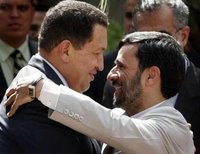

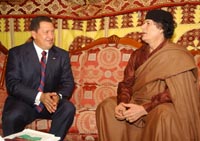
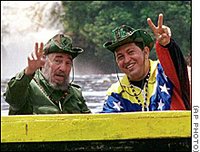
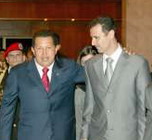
 Site feed
Site feed 